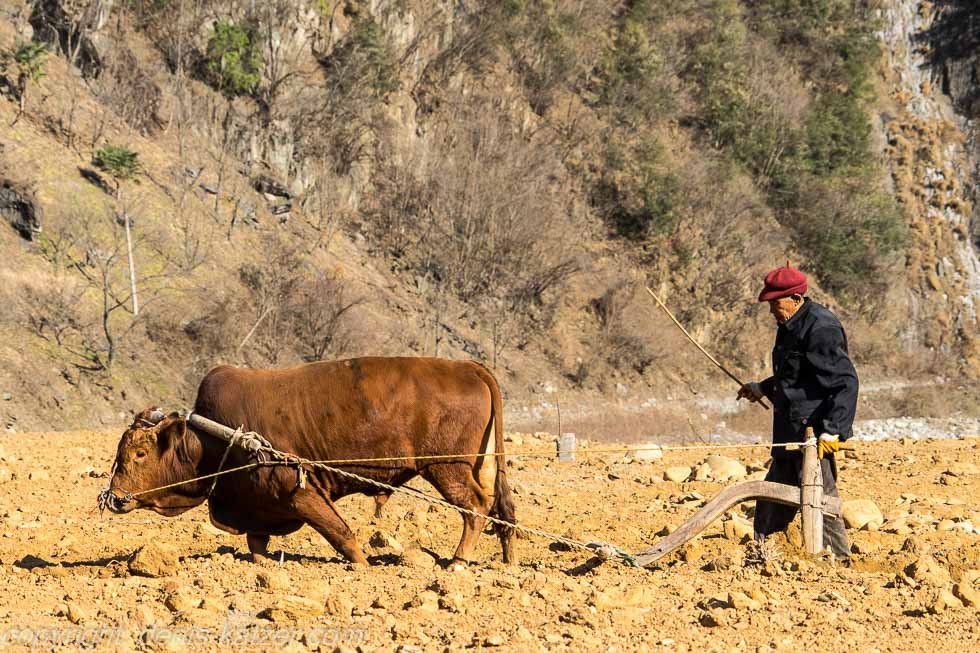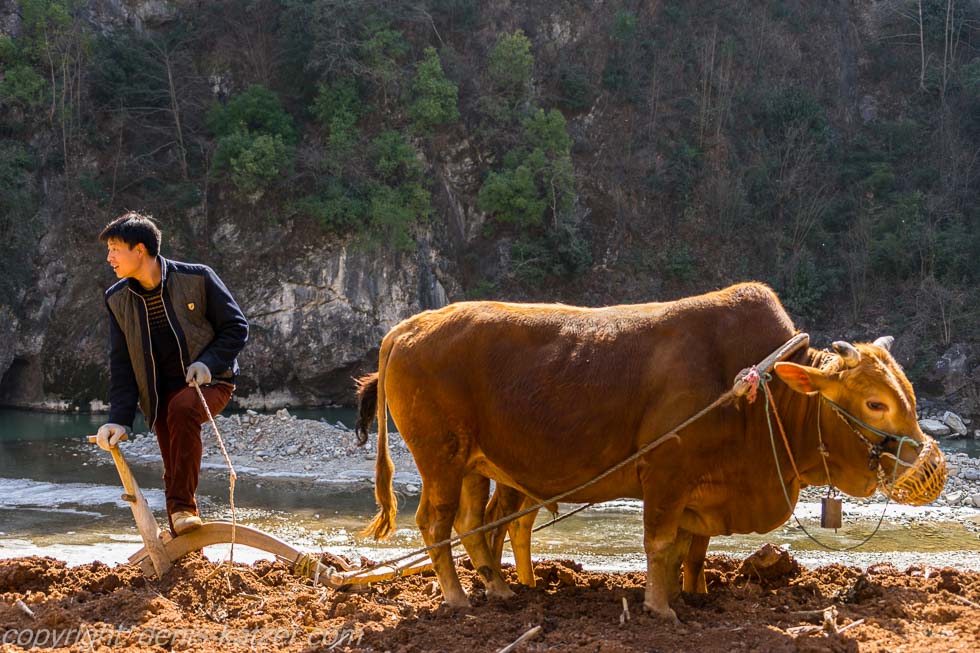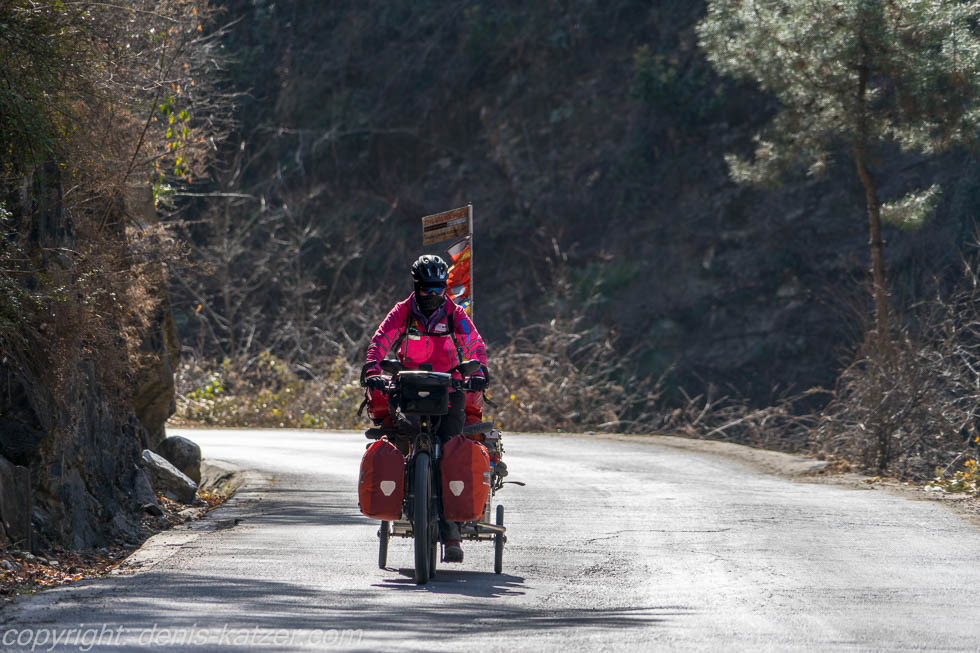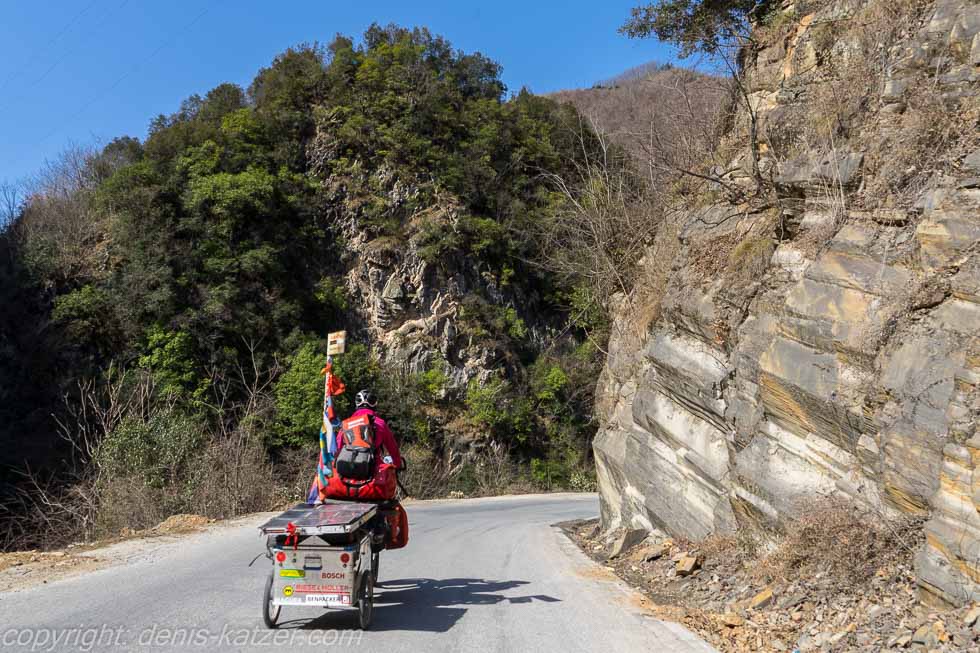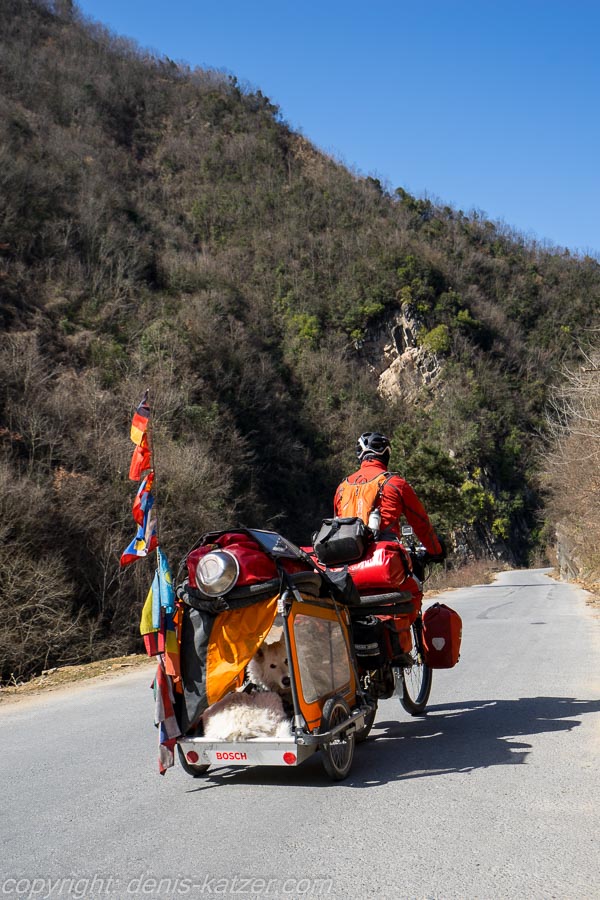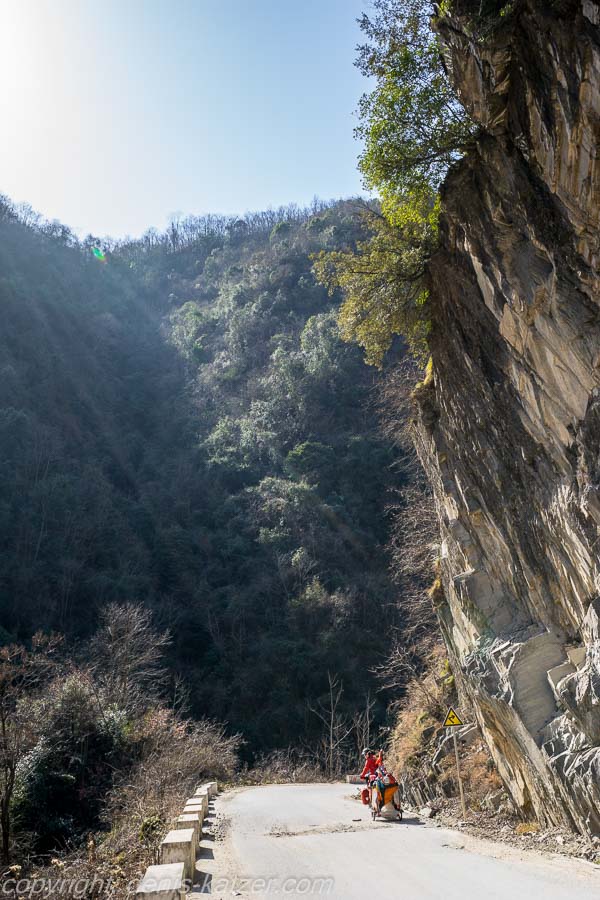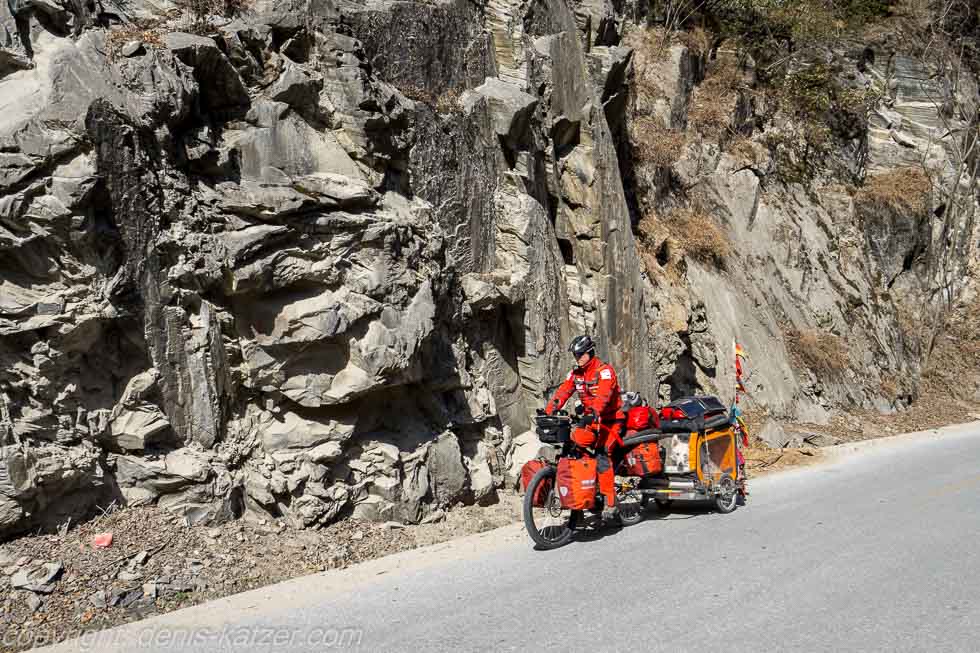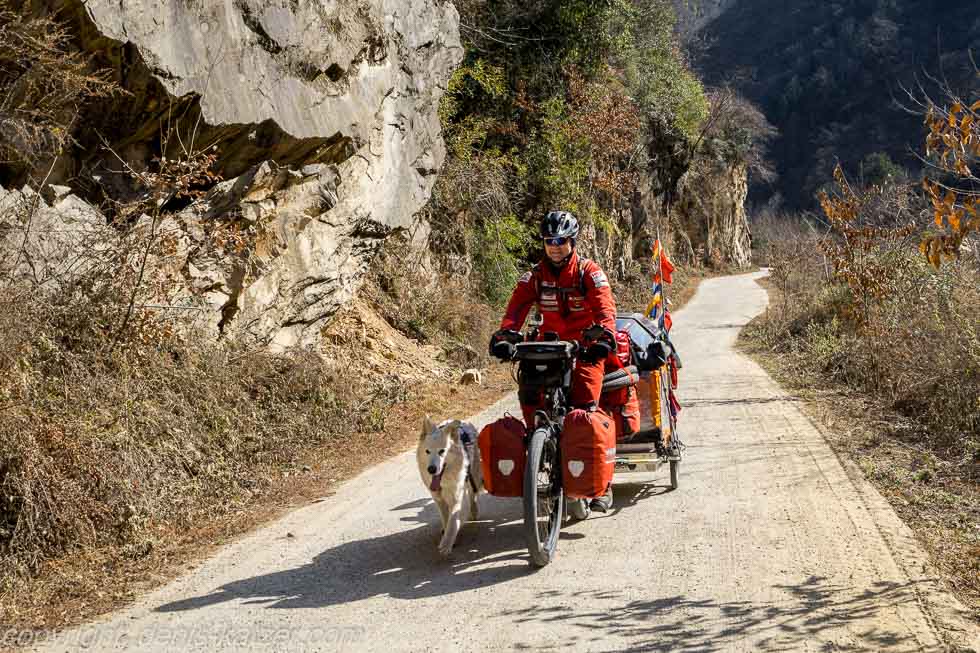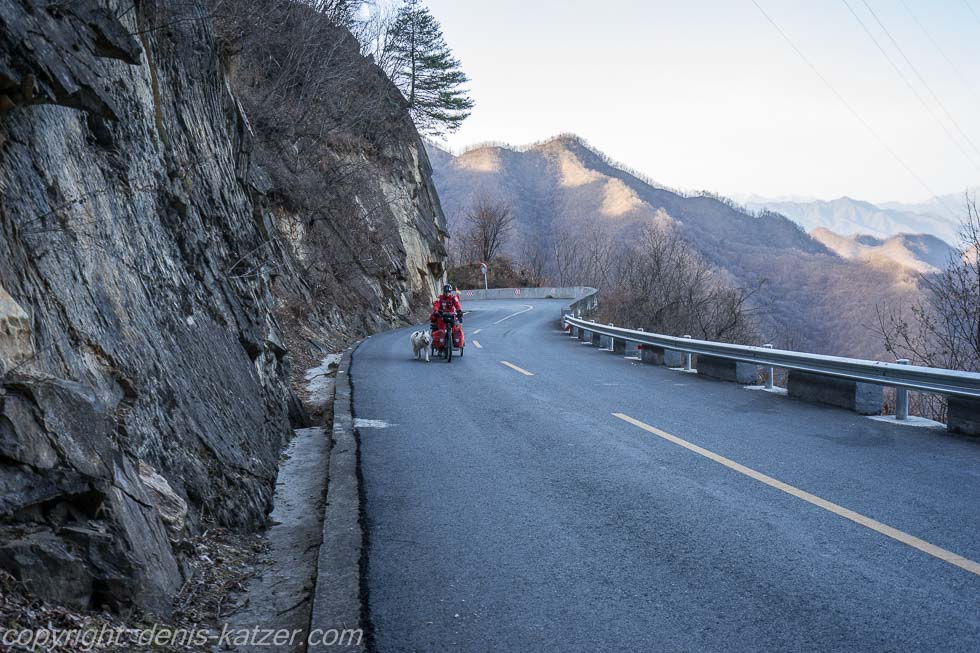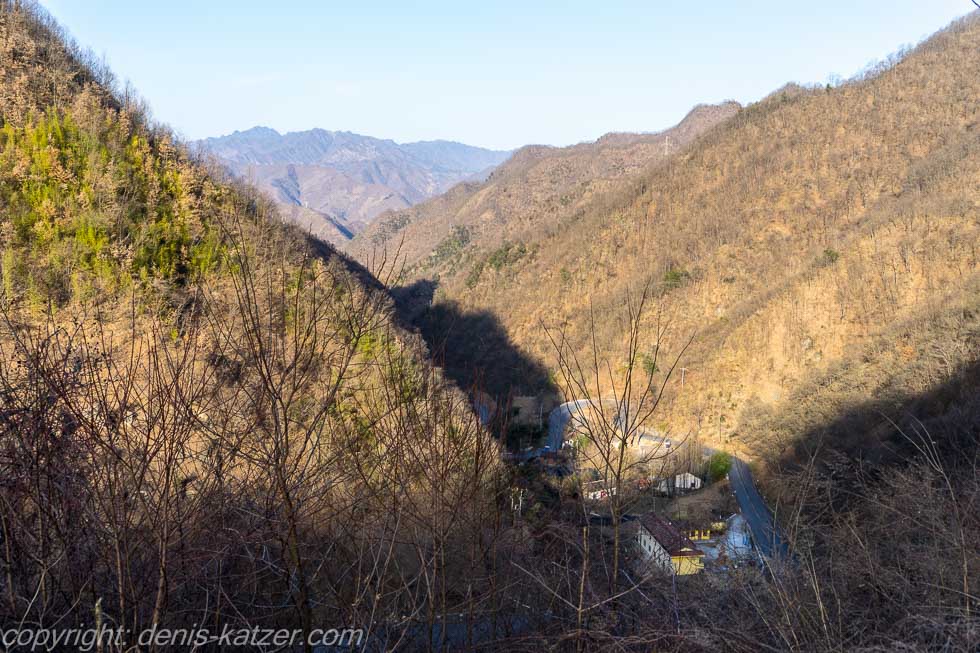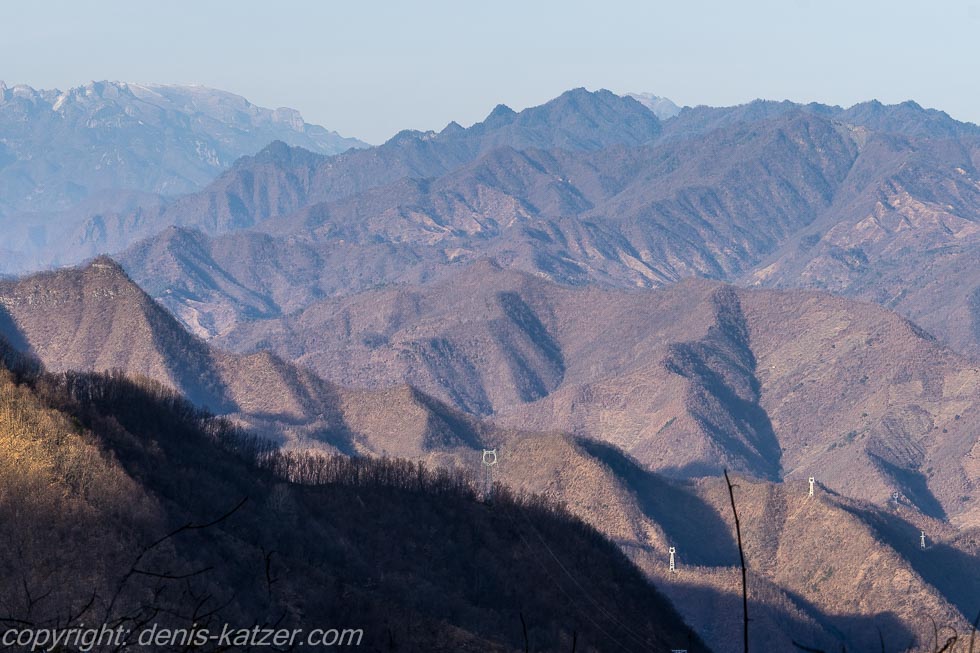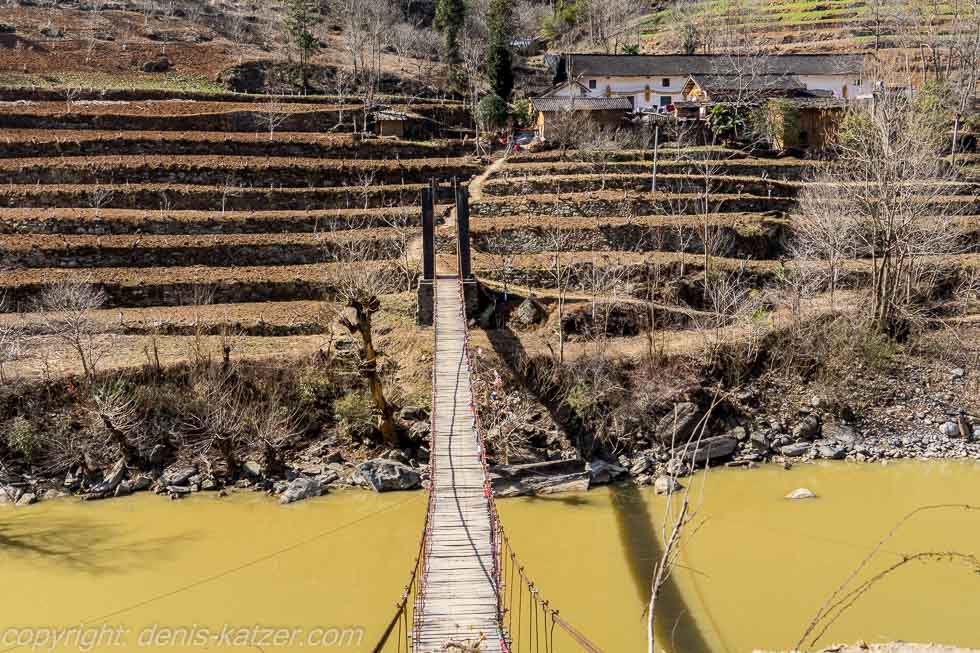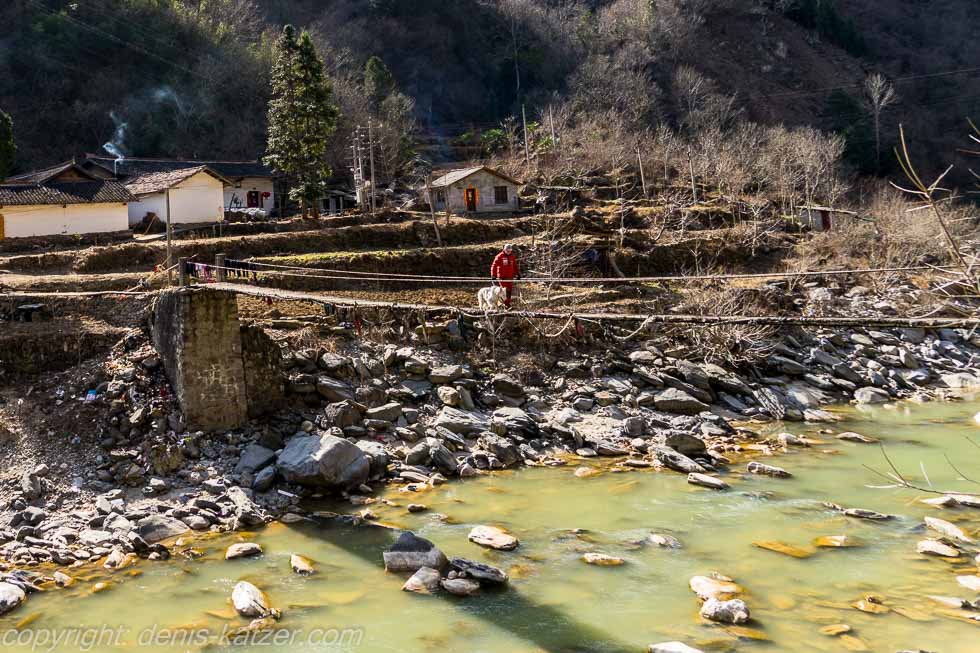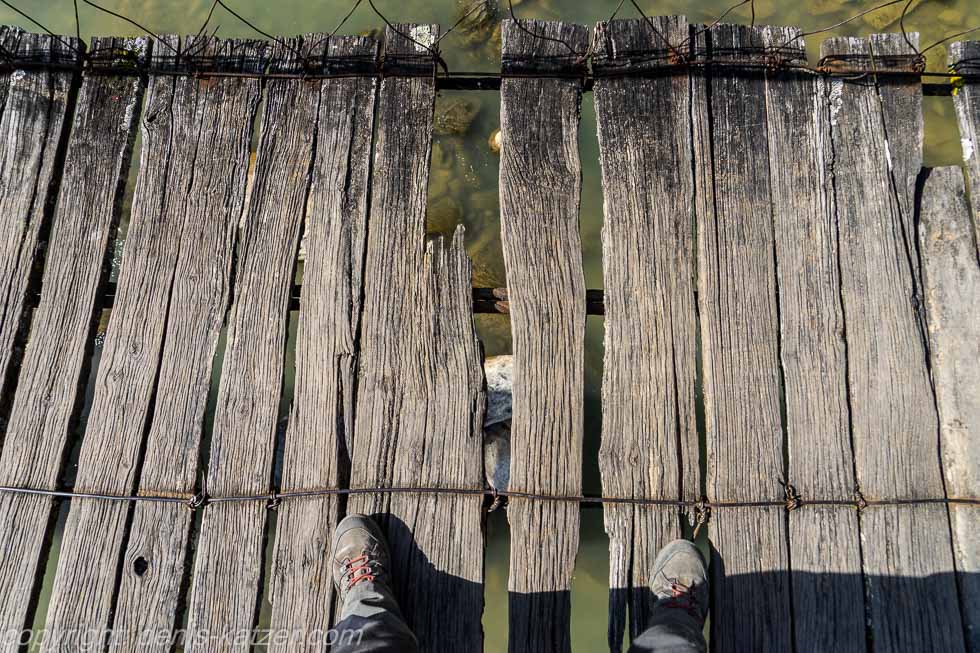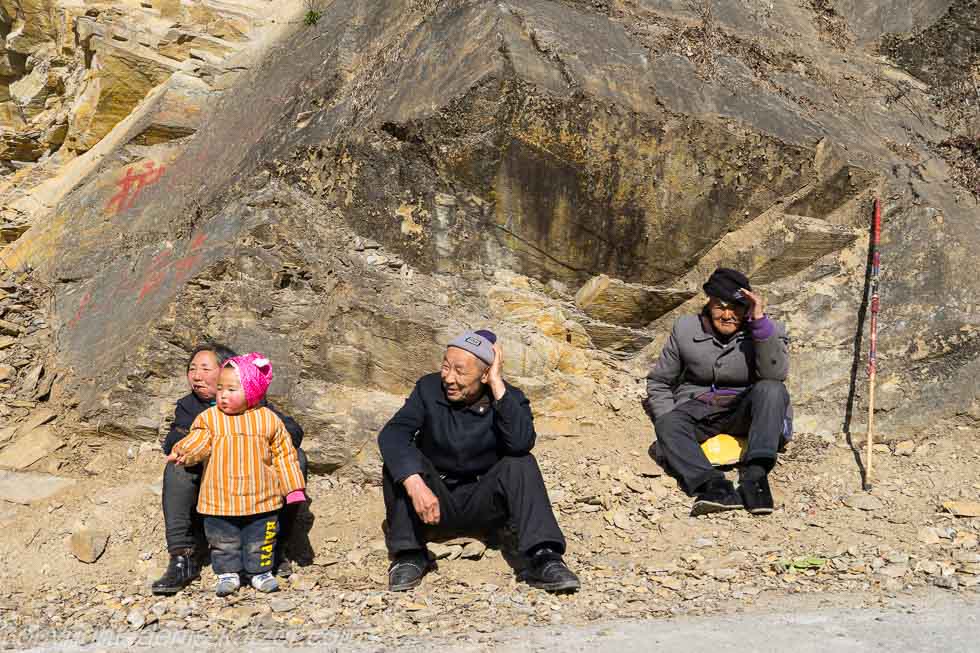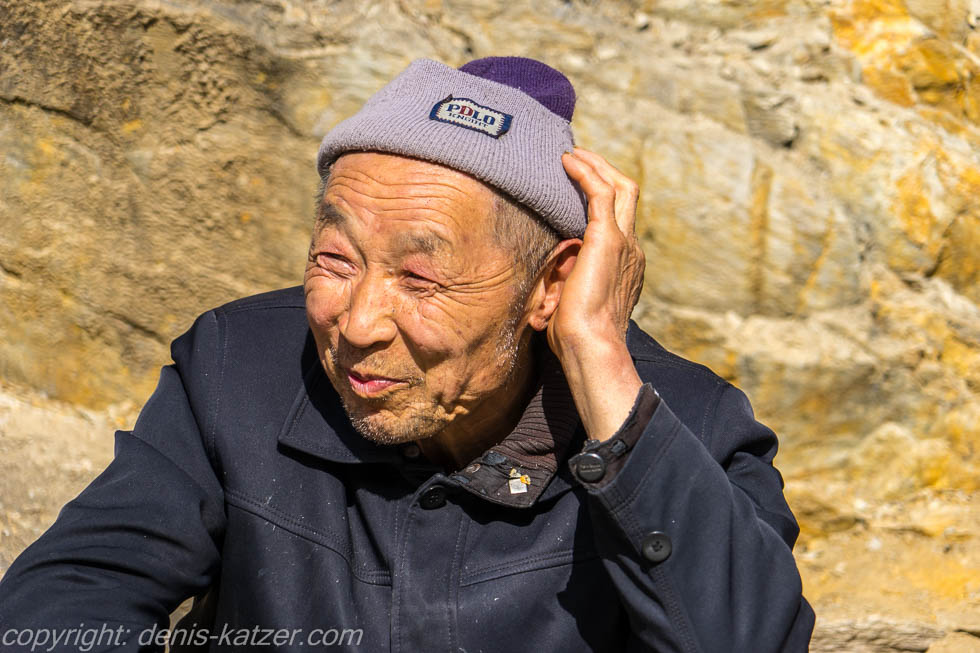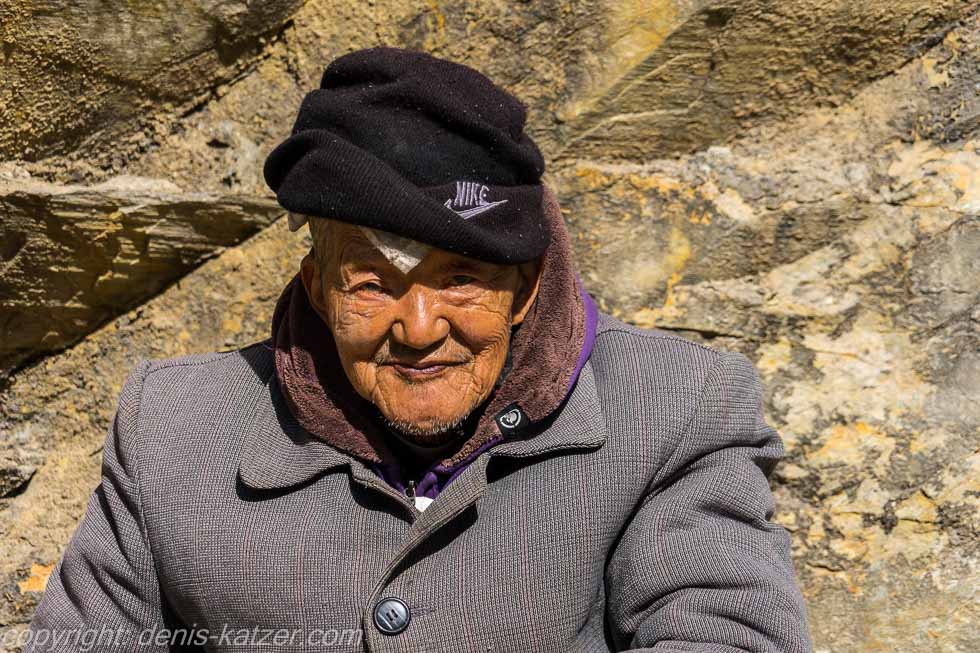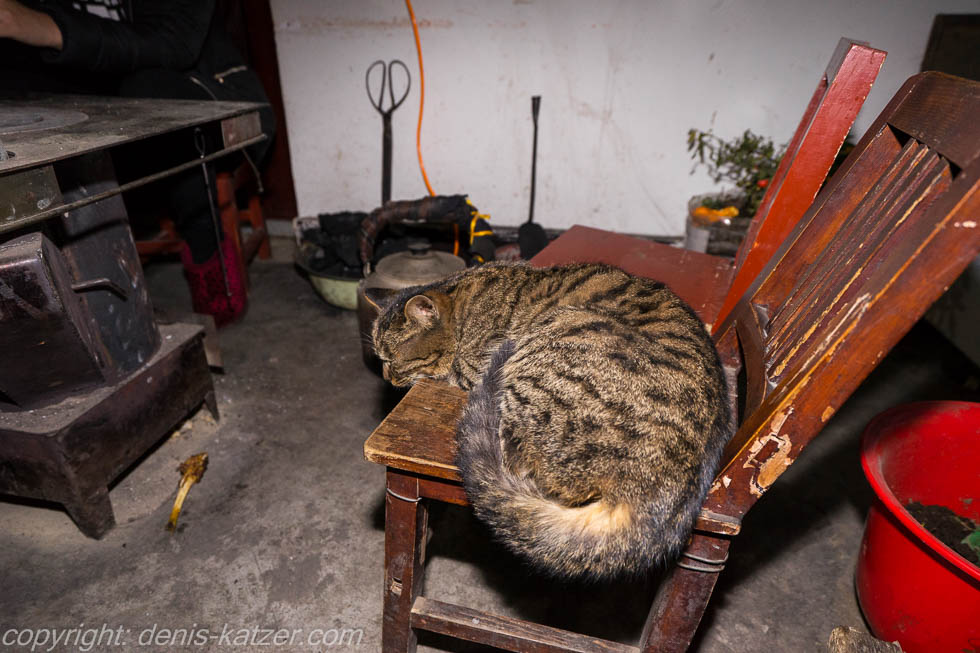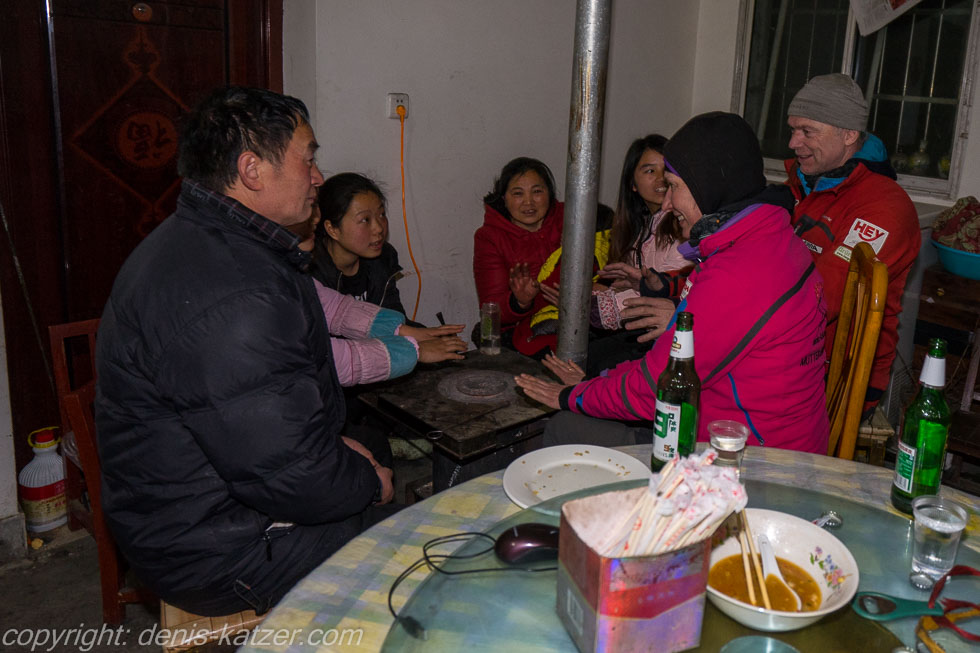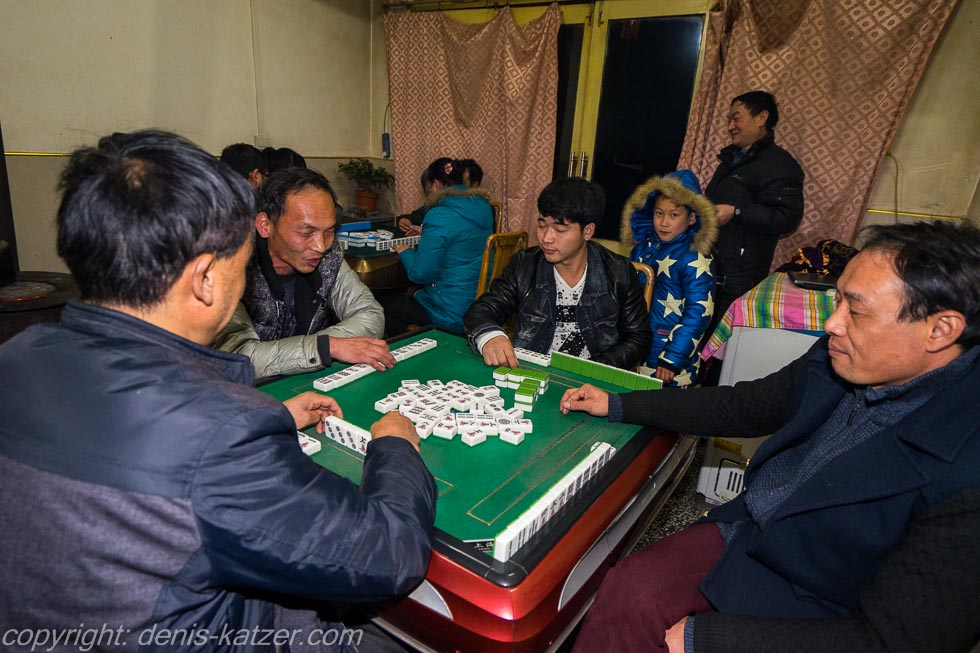
In the labyrinth of valleys, gorges and narrow roads
N 33°33'03.1'' E 108°32'40.6''
Date:
15.02.2016
Day: 231
Country:
China
Province:
Shaanxi
Location:
Xunyangbazhen
Latitude N:
33°33’03.1”
Longitude E:
108°32’40.6”
Daily kilometers:
123 km
Total kilometers:
12,131 km
As the crow flies:
45.78 km
Average speed:
19.3 km/h
Maximum speed:
50.3 km/h
Travel time:
6:22 hrs.
Soil condition:
Asphalt / gravel
Maximum height:
1.400 m
Total altitude meters:
19.120 m
Altitude meters for the day:
1.708 m
Sunrise:
07:31 am
Sunset:
6:28 pm
Temperature day max:
8°C
Temperature day min:
minus 6°C
Departure:
09:15 a.m.
Arrival time:
6:30 pm
(Photos of the diary entry can be found at the end of the text).
In the Google map I find a small street that doesn’t even exist in the MapsMe program. It is exactly the connection we need to reach the other side of the mountains by the shortest route. “This mountain road will save us a good 100 km,” I shout to Tanja, who understands and gives me a thumbs-up. As always, when I’ve worked out a good navigation, I’m in a great mood. In addition, the sun shines from the firmament and warms the day to around eight degrees. Our bikes carry us through a beautiful valley which is bordered on both sides by rugged rock faces. To our left, a steeply ascending road obviously leads over a mountain ridge. As it winds in a different direction, I ignore it and continue to follow the beautiful and new asphalt strip to the west. There are lots of weddings in the villages we pass through. Loud music thumps through the thin fabric walls of the tents. Red fabric columns and archways inflated with a compressor adorn the elaborately designed entrance, which is flanked by two golden dragon lions. Firecrackers are often set off, the volume of which sometimes almost lifts us out of the saddle. The valley becomes narrower and narrower and the road squeezes between newly built houses. Suddenly it seems as if we have landed on a residential street in the middle of the mountains. An uncertain feeling creeps over me. Modern construction boards show what is planned here. The houses are built in the old Chinese style. As if they wanted to build a tourist village here. Maybe there’s an attraction in these mountains that we haven’t heard about? Or is there another important reason to build a sales promenade in a remote valley? “Do you think we’re in the right place?” Tanja’s call brings me out of my thoughts. Then the traffic artery, which has hardly been used for a few kilometers, forks into two single-lane, concrete roads. This time I turn left. We bump steeply upwards. “That can’t be right!” I now reply to Tanja. We have to shift into second gear to heave our heavy steeds forward meter by meter. We are getting married again. We stop and ask where we are going today. All those present, who gather around us curiously, shake their heads. Either our pronunciation is so terrible or the place doesn’t even exist. I point my smartphone at the name of the small town written in Chinese. Although it is not our current destination, it is in our direction. “Ah, Ningshann,” they call out. “It doesn’t go any further here,” I hear, startled, as I can’t remember any turn-off that we could have missed. “If we have to return to our starting point today, we’ll have made a 40 km detour,” I say meekly, because an hour ago I was so pleased to have found a shortcut. Apart from that, it would mean having to take a 100 km detour. “If that’s really the case, time is running out,” I say, because we want to be in Chengdu at the end of the month because our China visa expires and we have to take the train from there to Vietnam. However, it is still about 800 km to Chengdu. So, in the time given to us, a long route that doesn’t allow for any detours. After a long back and forth, we understand that we have to drive back about five kilometers. Then we should hit the right road. Dejected, I let my Roadtrain roll back down the incline. In fact, after the indicated kilometers we come across the road that I had previously ignored. It is two lanes again and large traffic signs indicate that it is back on track. “Yippie!” I shout. A 2.7 km long tunnel saves us a pass crossing. We switch on the lights on the bikes and glide into the dark tube. On the other hand, we are gifted with an eternally long downhill ride. “If this continues, it will be an easy day,” I think to myself. Then we hurtle through the mountains at an altitude of around 700 meters. Tanja points to a gravel road that turns off to the right. As it is also outside the direction of the compass and hardly looks passable, I ignored it again. We ask an old man sitting on the side of the road smoking one of the Chinese pipes from long ago. Smiling, he points to the gravel road. “Well done,” I praise Tanja and am annoyed to have neglected an important turn-off for the second time today. Just a few kilometers further on, a concrete path, which can only be used by bicycles and mopeds, leads to the left into another mountain valley. Although it is impossible that it will lead us to our destination, I stop, study the maps and ask a moped rider who is just being released by a cloud of dust. He nods and points to the path. “Is that true?” Tanja is unsure. “How should I know that? We seem to have ended up here in a labyrinth of valleys, gorges and narrow roads. Maybe I should have taken the detour via the main road after all?” I reply and discover two farmers’ wives and a boy just a hundred meters further on, standing at the side of the road and seemingly waiting for something. They also point to the path, which is why we dare to follow it.
After about 50 km we take a break, eat dried bananas and almonds and quench our thirst with a yoghurt drink that we recently discovered in a supermarket. So far, we’ve never been on our bikes in China so far away from country roads and major connecting roads. We have actually landed in what appear to be dreamy mountain valleys. The air is clear and pure. The birds chirp and welcome the approaching spring. It is almost pleasant in the sun. Poor farmers still plow their fields with teams of oxen. We seem to have passed through the gateway to a completely different world. A hidden corner of China where rapid progress has yet to make its mark. We enjoy the absolute peace and quiet. No cars, no trucks and very rarely a moped. What a dream. Once again, the country shows a variant that we would not have expected in this form. After another 20 km, the small path spits us out onto a wider road. Although we regret having to share our journey with a few rolling heaps of metal again, we are glad we didn’t take a detour.
The valley through which we are now driving is wide. A simple suspension bridge crosses the river every few kilometers. Because the other side of the river is in the shadow of a high mountain ridge, a few villagers cross the rickety bridge to sit in the sun on this side. We welcome people who are initially shy and reserved. Then we continue our journey.
It is already 15:00. It is only 15 kilometers as the crow flies to our destination for the day. At 3:30 p.m., a mountain range lies across the road, which is why it suddenly winds upwards in serpentines. “You’ve built us another pass,” says Tanja jokingly, unaware that we have a huge climb ahead of us that will take us almost three hours. Initially, it begins quite harmlessly. However, after a few bends, we have to tilt our heads back to be able to see the road winding steeply upwards. “I don’t believe it,” I say in amazement as I realize that I actually have to get to the top of the mountain today. “How much further to the finish?” asks Tanja at 16:00. “Another seven kilometers as the crow flies,” I reply. We put in our fifth battery, which is empty after another eight kilometers. “Will we still make it to the finish?” asks Tanja. “It’s getting tight,” I say as we have to insert the sixth battery and still haven’t reached the top. Although we are already completely exhausted, we switch from comfortable turbo mode to sport mode. In the meantime, temperatures are falling well below zero again. Because our clothes are soaked from sweating, we start to freeze up here. In the meantime, we look for a place to pitch our tent. “Do we have enough water with us?” I ask. She shakes her head. “It’s enough to quench your thirst but not enough for a hot meal,” I hear. To avoid loading up even more, we recalculate our daily water consumption every day and only take enough for a day trip. As today’s stage was calculated to be just under 90 km, we never expected to have to set up an emergency camp. “Why is it so far?” asks Tanja, after our on-board computers already show 115 kilometers per day. “I don’t know. I can only imagine that Google can’t calculate the distance accurately on the small pass roads,” I reply, panting heavily due to the effort. We stop briefly and have our last yogurt drink. To save energy, Ajaci has been allowed to run alongside the bike for several kilometers. There is no traffic here. We are the only ones on the pass road for a long time. At 1,400 meters, we reach the highest point of the mountain. It slowly begins to dawn. The sun has long since withdrawn its warming rays from us. We have already been on the road for 8 ½ hours. “How many kilometers do you have left in the battery?” I ask Tanja. “Seven,” she replies. “According to the GPS, it’s still eight kilometers as the crow flies to the village of Xunyangbazhen. We can manage that if it’s in a valley,” I think. “Camping doesn’t make much sense, does it?” asks Tanja. “Well, with the battery level? Where are we going to charge the batteries tomorrow? There are no sockets here in the wilderness. And there’s not enough sun for a solar charge. So let’s try our luck. Maybe we’ll make it to this little town after all,” I hope. So that the chill factor doesn’t freeze us into pillars of ice during the descent, we put on everything we’ve got. Then we load Ajaci into the trailer and let our e-bikes hurtle down into the valley. “Take care of yourself! Don’t drive too fast!” warns Tanja. “Yes, I’ll do that. You take care of yourself too!”
After just a few kilometers, the wind cools us down despite all our clothes. Again, it is difficult to pull the brakes with numb fingers. Laundry houses appear to the left and right of the path. “I wonder if we should seek shelter in there for the night,” I think to myself. Suddenly the greenhouses disappear again and the mountain throws new ridges in our path. “I only have enough juice for three kilometers!” Tanja shouts behind me. Because I ride the new 500 watt batteries and Tanja’s 400 watt batteries usually run out two to three kilometers before mine, we still have an emergency reserve of a maximum of ten kilometers for both bikes. After that, however, our energy supply would be completely used up. “How much further?” I hear Tanja ask. “Another two kilometers as the crow flies. But you know what as the crow flies means. That doesn’t say much about the actual distance,” I reply as the town sign suddenly appears. “It can’t be far now!” I rejoice. “Good, my battery level is zero,” Tanja announces. Then a few low huts and houses appear. We do not know whether there is accommodation here. Even Jane, who works in marketing at Bosch and is now helping us look for a place to stay for the night, couldn’t find anything in this village.
In the darkness, we see a few women dancing to Chinese music at the side of the road. A sport that is practiced almost everywhere in China at any time of day. We stop and ask for a Lüguan (hotel). “There in front”, we understand. The gymnast interrupts her dance and accompanies us to a flat house with two red lanterns hanging in front of the entrance. A man and a young girl approach us. “Can we spend the night with them?” we ask. They look at us indecisively. “We’re very tired and need to rest,” I say. “I understand,” the girl replies in usable English. “You speak English?”, Tanja asks in amazement, because we didn’t expect that in such a remote village. “Yes,” she replies with a shy smile. When we talk about the fact that our bikes, trailer and the dog also have to go inside, the man’s brow furrows. “May I have a look at the room?” asks Tanja without responding to the owner’s hesitation. Five minutes later, Tanja steps out onto the street again. “It’s a very simple, tiny room with no heating,” she says. “Never mind, I’d even sleep on the floor in a garage. Is there a power socket inside?” I want to know, to make sure we can charge our batteries. “Yes.” “Good, then let’s get off the road,” I say and start unloading the bikes. In the meantime, many people have gathered around us. Sure, they haven’t seen any foreigners here yet. And some of them are on the road with a big white dog and bicycles. “Can I help you?” asks a boy of about ten. “Absolutely,” I say in surprise, handing him a pannier. Now everyone helps to carry our equipment into the building. Old junk is shifted in the small vestibule so that our bikes and trailers actually fit in. On the way to our accommodation, we pass through a heated room where around 20 villagers are playing a lively and noisy game of mahjong. It is, so to speak, the town’s gambling den. As we cross the room with our things, those present stop playing and look at us in amazement. We learn that this inn belongs to the village teacher and that he is the reason why some of the children here speak English.
After we’ve tucked Ajaci and the bags into the little room, the two daughters of the village teacher take us to a kind of restaurant on the opposite side of the street. The only table in there is sticky and completely filthy. When the landlord notices my disgusted expression, he gets an old rag and smears away the leftovers. The teacher’s two English-speaking daughters instruct him to put up a new plastic tablecloth. This is done immediately so that we can place our arms on the table without sticking to it. After 123 kilometers and 9 ½ hours, we are extremely hungry and order a vegetarian pasta dish despite the obvious lack of hygiene. The corpulent landlord immediately disappears into his simple kitchen and tinkers with the wok. In the meantime, his wife offers us a seat by a small coal stove. We warm our frozen hands. While we wait for dinner, we learn that the two daughters of the village teacher are studying English about 1,500 km away from here. “We always come home during the New Year holidays. That’s the only time of the year when we see our parents,” they explain. “Oh, then this is certainly a very happy time,” I say. “Yes, the best,” the two students reply. Then the landlord serves us two large plates of delicious egg noodles and vegetables. It tastes absolutely fabulous, and not just because we’re hungry. After the meal, a villager attached his laptop. He proudly shows us the Google map. “If you continue your journey tomorrow, you have to be careful. There’s a 2,300-metre-high pass ahead of you. There’s snow up there and the roads are frozen,” he warns us. “Will we even get over it with our bikes?” I ask anxiously. “Should be fine. But you have to be careful,” we hear. “And I thought we’d left the snow and ice behind us,” I puff out, seriously worrying whether I haven’t laid an egg by taking the shortcut over the mountains.
The temperatures in our room are comparable to an icebox and are around minus five degrees. Tanja is lying with her sleeping bag on an old electric blanket that actually works. But because I have plugged the four-pin connector into the second socket to charge our batteries, I have to do without the luxury. To avoid freezing to death, I put my summer sleeping bag inside the winter sleeping bag and slip into it. Only now am I starting to feel warm. At 1:00 a.m., my arm computer rings. I unplug the first four fully charged batteries from the power strip and connect the next four power collectors. At 5:00 a.m. I charge the last four energy stores, so that we are ready for the next day and hopefully get over the frozen pass in one piece…
The live coverage is supported by the companies Gesat GmbH: www.gesat.com and roda computer GmbH http://roda-computer.com/ The satellite telephone Explorer 300 from Gesat and the rugged notebook Pegasus RP9 from Roda are the pillars of the transmission.
